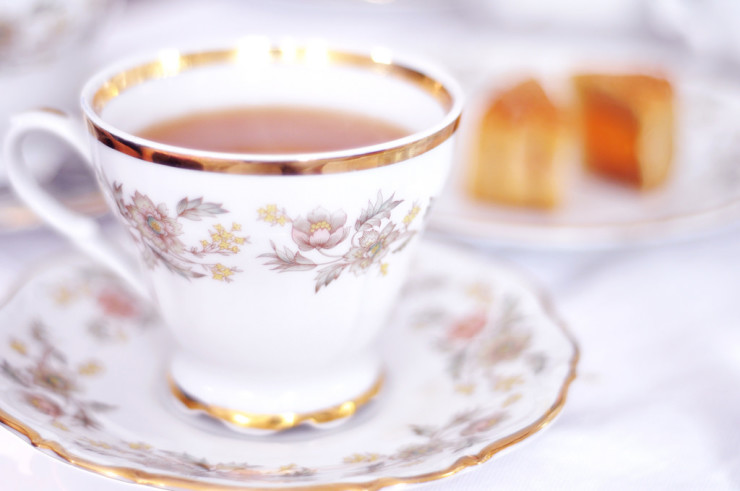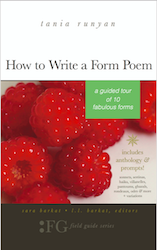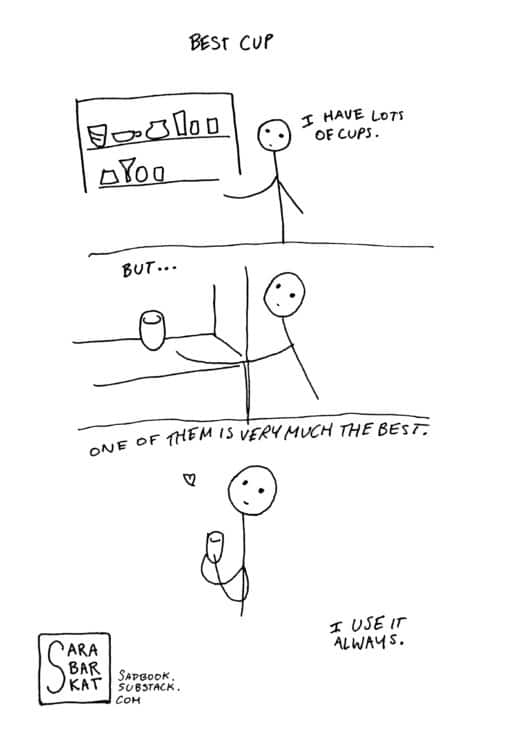10 of the Best Tea Poems!
I would like to say that tea and poetry go together like sand and surf, like wine and cheese, like Bogey and Bacall. But as one whose coming to tea is inseparable from coming to poetry, the truer thing seems to be to say that all of those things go together like poetry and tea.
Poets, of course, have known this for time immemorial. Steep with these 10 tea poems and see if you don’t agree.
1.
Creme Earl Grey
It is fragrant in here,
behind the diamond-shaped
glass, under the white tin
cover, spiraled to finality
(at least for now). Black leaves
nestle curls into curls,
brush against lavender
and pearlescent petals, suspended
until a hand brings water
and vanilla-hungry air.
— L.L. Barkat, first appeared at Chateau Rouge Tea
BUY ‘HOW TO WRITE A FORM POEM’ NOW!
2.
Valentine’s Chai
Sitting in a sunny cafe, I call my parents
because I can’t stand to hear
bad news at home.
So I call from here, on my cell,
armed with chai.
She’s telling the doctor, No more.
She will leave his office with some pills
that will lengthen her sweet tooth in time
for Valentine’s Day.
I quaff my tea and head to the store
for candy hearts, chocolate hearts,
Reese’s peanut butter hearts, heart-shaped
cookies piled with icing—any
confectionary way to say I love you I love
you I love you I love you I love you.
— Megan Willome, author of The Joy of Poetry: How to Keep, Save & Make Your Life with Poems
3.
Morning Tea with Julie
Fruit, more fruit,
a real combination of fruit:
you and me,
on a subtle base of Ceylon and China teas—
cherry, strawberry,
peach and orange,
a whirl of flavour.
And. Outside our window,
scattered sunflower petals.
—L.L. Barkat, for Sam and Julie, based on a catalog description at Betjeman & Barton
Click to get FREE 5-Prompt Mini-Series
4.
My breath skates
across the glass,
golden scales push off
in electric bright
rifles at dawn.
I sip the flowers.
They flesh
in a way I see
when deposed of you,
carefully.
Now is the time for silence
of recognition—
the wintering observation.
I am a centering figure
bright to catch.
The lit wick of you
sleeps in another country.
I look at the glass,
watch a flower unfurl
and darkly lit, I fall.
—Sandra Marchetti, from Confluence
5.
The Proposal
“Perhaps, let’s go to Delft, ”
he said, taking the silver tea caddy
gingerly off the shelf. It was Betjeman and Barton—
not the shelf, which was of rosewood,
but the caddy painted slight with numbers, avoirdupois,
the weight of tea I steep to pour in porcelain.
“Why should we?” I lifted porcelain.
Not the kind they make in Delft—
copied from the Chinese, high-resistance, unlike the measure avoirdupois
adopted through a confluence of words… Latin, French as the tea caddy
I opened for the promise, that petaled-rose would
spread its fragrance with Darjeeling; Betjeman and Barton
sell it so. I wonder if it’s Betjeman or Barton
who dreamed of almonds, grapes and peonies to drift in porcelain.
Who bare-suggested in a whisper that a hint of rose would
be a better choice than, let’s just say, a tulip, yellow, plucked from Delft?
I mused on Netherland’s canals and stretched towards the tea caddy.
What if he could weigh my thoughts in dark avoirdupois?
A measure partly from the Latin, avoirdupois
came over from to have, to hold, possess, like the Betjeman and Barton
I hold this very moment, twisting cover of a tight-sealed tea caddy
which, had it come from long ago, might rather be of bone-ash porcelain
hand-painted blue with scenes of domesticity from Delft.
Milk maids, windmills, a tulip— not a rose— would
play across it like the Madagascar sun on rosewood
stolen from the tropics, shipped through China, measured in avoirdupois—
all multiples of which are based on pounds, like stones of city walls in Delft.
You cannot find this in the catalog from Betjeman and Barton,
the knowledge that the British added stones as hard as fired porcelain,
or that the city once exploded like the fragrance from this silver tea caddy,
assaulting air and narrow streets with powder they don’t sell in tea caddies,
brass-mounted, inlaid carefully, satin-wood or rosewood,
the larger ones called tea chests, often seated near the porcelain
in dining rooms where merchandise bears not the paint of bold avoirdupois
but is quite fragrant with rare teas of fine purveyors. Betjeman and Barton
is my favorite, see, residing in the heart of passion—Paris—not in Delft.
I place the silver tea caddy directly on the shelf, unpainted with the weight of ebony avoirdupois,
silver tipped with fresh-spilled leaves scattered on the rosewood, lined with Betjeman and Barton
rarities to pour into my porcelain, which would, I tell him, never come from Delft.
—L.L. Barkat, first appeared at Best American Poetry
6.
Ordinary Time
After fiery tongues. After wind all night. After we’ve said
we’re sorry. This is what’s left. Disheveled hair from fitful sleep.
Hunger for toast and jam. Tea with milk clouding its surface.
Sons off to school and the house lost to quiet.
Clock on the mantle silent. Key on the sideboard to wind it.
—Todd Davis, from In the Kingdom of the Ditch
7.
A monk sips morning tea
A monk sips morning tea,
it’s quiet,
the chrysanthemum’s flowering.
8.
pnw. pacific.north.west.
we are
so far away
that to make it worth your while,
it really ought to be a weekend tea—
not to be confused with weakened tea,
of course.
sister/brotherhood
of the traveling teapots.
—Darlene S., from a Saturday social media conversation
Click to get FREE 5-Prompt Mini-Series
9.
Waking Without Alarm
a day without obligations
slivers of silver spilling from the shades
a small ceremony of jasmine tea
in the Japanese pot
ten minutes of Qi Gong, twenty rubbing Watson’s belly
in the evening, a pang of regret for a lazy day
then remembering
I deserve a chance to do something or nothing
innate joy rising
and Watson, smiling, asleep in his basket.
—Karen Paul Holmes, from Untying the Knot
10.
Tea, No Sympathy
Bigelow brews up basic black;
Lipton warms with its touch
of tart Tuscan lemon. But I see
these aren’t your cups of tea.
With them, you get no yin, no
yang, no sweet and bitter blend
of Golden Flower, no accents
of lanky Jasmine Fairy Maidens
quick to unfold their charms
in the tallest sipping glasses. You
tend to trend to gourmet tastes,
need all the tea in China to brew
old Harney’s Golden Monkey,
uncovering leaves’ clearest notes
of honey to sweeten and loosen
your Rumi’s tongue. “Take tea
with me” comes in a silken sachet
I need not strain to decipher. Oh,
to get tippy in Assam’s best garden,
to unwrap your golden Dikom buds
as I unwind my pearls and purple sari.
— Maureen Doallas, author of Neruda’s Memoirs
Browse more Tea Poems
Enjoy the fruit of a night on Twitter, with tea
Photo by Laura D’Alessandro, Creative Commons license via Flickr. Poems used with permission of the publisher or author or are in the public domain.
- Earth Song Poem Featured on The Slowdown!—Birds in Home Depot - February 7, 2023
- The Rapping in the Attic—Happy Holidays Fun Video! - December 21, 2022
- Video: Earth Song: A Nature Poems Experience—Enchanting! - December 6, 2022




Bethany R. says
What a yummy post – such an array of beautiful pieces and moments here. I want to live an hour in Basho’s lines:
“it’s quiet,
the chrysanthemum’s flowering.”
Rick Maxson says
I am not a tea drinker like my wife, but these are all very inviting. Love “pearlescent petals.” “Ordinary Time”—wonderful—the extraordinary ordinary.
Laura (L.L.) Barkat says
Tea is a drink of nuance. You might explore (I recommend loose teas especially, for this) and see what happens 🙂
Laura (L.L.) Barkat says
Oh, and thanks for the note about “pearlescent petals.” It is my feeling that a poem should be almost a physical experience on the lips. How very much more apt for a tea poem! 🙂
Carl Sharpe says
These are delightful. L.L. Barkat’s poem is delicious, especially with that Barkat-like ending. Thanks for this collection.
Laura (L.L.) Barkat says
Thank you so much, Carl. I am smiling at the thought of a Barkat-like ending, whatever that might be 🙂
Karen Paul Holmes says
Thank you for including my poem among these lovelies!